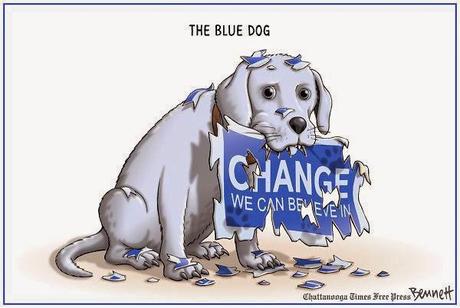 (This cartoon image of a "Blue Dog" is by Clay Bennett in the Chattanooga Times Free Press.)
(This cartoon image of a "Blue Dog" is by Clay Bennett in the Chattanooga Times Free Press.)Some Democratic candidates think it is smart to run away from the president and principles of their own party -- claiming to be an "independent" who just happens to be running on the Democratic ticket. They all refused to let the president campaign for them (and one even refused to admit she voted for the president of her own party), and they all refused to publicly support the progressive principles of their own party.
Take it from this Texan (where we have a tradition of Democratic candidates running away from their party), that is not a winning strategy. And the Blue Dogs learned that in this election. Pryor (Arkansas), Begich (Alaska), Hagan (North Carolina), Grimes (Kentucky), and Nunn (Georgia) all were guilty of this -- and all of them lost their electoral bid. If you can't be a real Democrat, supporting your party's president and principles, you can't expect progressive Democrats to work their butts off for you -- and you can't expect Independents to run to the polls to vote for you. If you will abandon your own party, why wouldn't voters think you'd do the same to them when push comes to shove in Washington?
I think there is a good chance the Democrats can keep the White House in 2016 -- and garb control of the Senate and possibly even the House. But that won't happen if Democratic candidates are too timid to support Democratic principles. Here's how Adam Green and Stephanie Taylor, co-founders of the Progressive Change Campaign Committee, put it:
Democrats lost on Tuesday, as widely predicted. But for months, pundits got wrong what Democrats would need to win. There was rumor that youth turnout, Latino turnout, and cutting-edge Get Out The Vote practices would tip the balance in close races. But when "close" elections are decided by 7 to 12 points, something much bigger is happening. Pundits say President Obama was unpopular. Score one for the pundits. But the critical question is: Why was the president so unpopular? Did voters not show up because of Syria, Obamacare, or Ebola? No. Was President Obama proposing some big liberal idea, sparking backlash? No. It's hard to remember the last time the President offered a big idea. Jobs and economic security are consistently the top issues voters say they care about in red, purple, and blue states. But Democrats did not have a united economic agenda in this election. Voters did not wake up on Election Day thinking that their ability to have a job, have affordable college education, or to retire with security was at stake. It was a Seinfeld-ian election about nothing. And nothing does not inspire potential voters to vote. In the absence of big ideas, Democrats lost. (Of note, some Democrats campaigned as Republicans. Mark Pryor (D-Ark.) campaigned as the "most conservative Senate Democrat" -- but voters chose a real Republican over a fake one.) However, someone did spark energy this election cycle. Sen. Elizabeth Warren (D-Mass.) attracted standing-room only crowds in red and purple states. Democrats who didn't want to be seen with the president were proud to be seen with Warren. And Warren was the most popular Democrat on the campaign trail for a reason: Her message of taking on Wall Street, reducing student debt, and expanding Social Security benefits is popular everywhere. While progressives such as Sens. Al Franken (D-Minn.), Jeff Merkley (D-ore.), and Brian Schatz (D-Hawaii) won re-election -- and Representatives Rick Nolan (D-Minn.) and Mike Honda (D-calif.) won their close races -- they won because they have consistently been economic populists and local voters knew that. But for other Democrats across the nation, nothing substitutes for a clear, authentic, united Democratic message focused on big ideas. Moving forward, something needs to change for Democrats. We need a bigger politics. We won't win our own tidal wave elections unless we can build a movement around big ideas -- like free college education, full employment, Medicare for All, expanded Social Security, and real reform of Wall Street. We need to make these issues so central to the national debate that candidates actively campaign on these ideas. And we need to start now. Hillary Clinton may be coming around to this strategy. In the final few weeks of the campaign, she tried to sound more and more like Sen. Warren. (While not hitting the language precisely, the intent seemed admirable.) Progressives will be organizing in states like New Hampshire and Iowa to ensure that all Democrats running for president take a position on -- and campaign actively on -- Elizabeth Warren's bold populist agenda. This is the path to victory in the primary and general election. A national progressive movement stands ready to work with those leaders in Congress who choose to recognize this imperative and step up to champion big ideas. And if Obama makes Warren's agenda the centerpiece of his agenda in 2015, his popularity will rise and Americans will get the debate about big, bold ideas that we deserve. Focusing on big ideas is the path forward for progressives and Democrats. The Warren wing of American politics is ready to lead.

